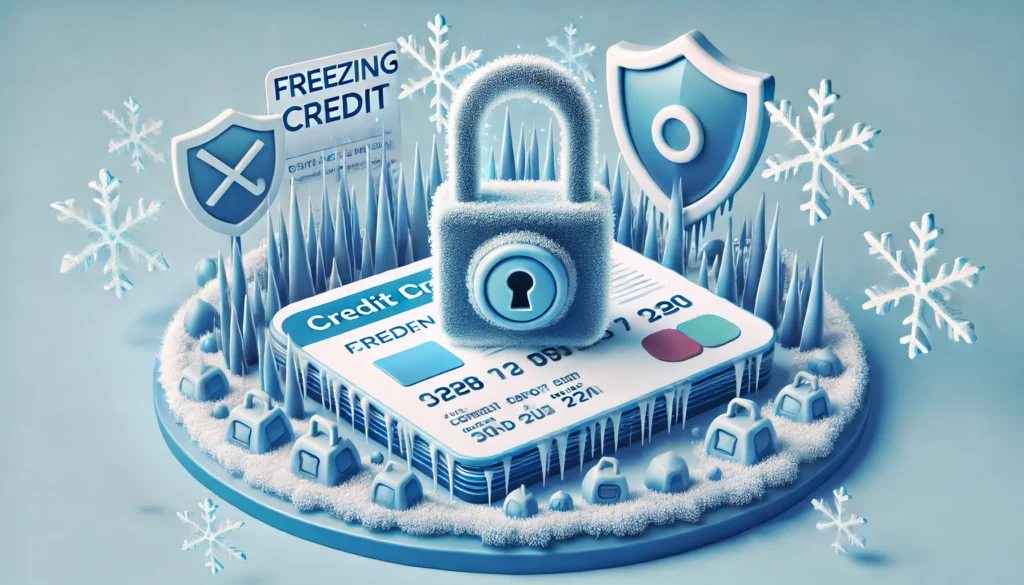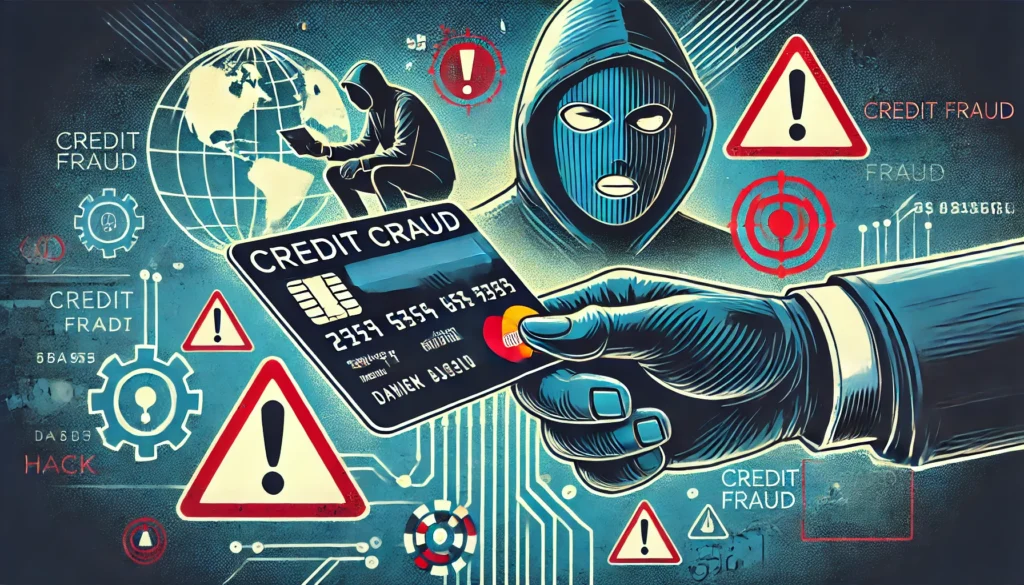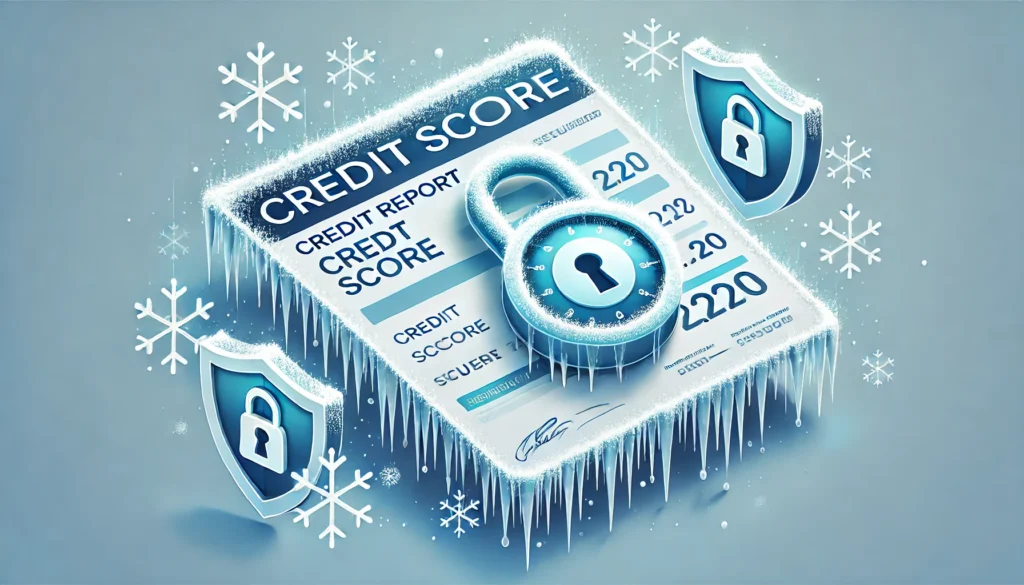In today’s digital age, protecting your credit is crucial. Freezing your credit, also known as a security freeze, is one of the most effective steps to safeguard your financial identity.
With over a decade of experience in financial consulting, I’ve seen firsthand the peace of mind that comes from knowing your credit information is secure.
Let’s dive into how to freeze your credit, its benefits, and the steps involved.
Key Takeaways
- A credit freeze restricts access to your credit report, making it harder for identity thieves to open accounts in your name.
- The process is straightforward and can be done online, by phone, or by mail with the three major credit bureaus.
- Freezing your credit is often free and does not affect your credit score.
What is a Credit Freeze?
A credit freeze, or security freeze, allows you to restrict access to your credit report.
This makes it difficult for identity thieves to open new accounts in your name, as most creditors need to see your report before approving a new credit line.
Unlike fraud alerts, which only warn potential creditors, a credit freeze locks down your credit information completely for a certain period as requested.

Why Should You Freeze Your Credit?
Freezing credit mainly comes from the threat of identity theft, temporary financial situation management and to enhance financial security for a certain period.
Protecting Against Identity Theft
Identity theft is a growing concern. By freezing your credit, you prevent unauthorized access to your credit report, reducing the risk of fraudulent accounts being opened in your name. This is particularly crucial if you’ve been a victim of identity theft before.
Enhancing Financial Security
Freezing your credit enhances your financial security. It allows you to control who can access your credit information, providing an extra layer of protection. This is beneficial for individuals looking to proactively manage their financial security.
Managing Temporary Financial Issues
If you’re undergoing significant life changes, such as a divorce or job loss, freezing your credit can prevent additional financial stress. It ensures that no new credit lines are opened without your consent during a vulnerable period.
How Does a Credit Freeze Work?
When you freeze your credit, the three major credit bureaus (Equifax, Experian, and TransUnion) prevent any access to your credit report.
This doesn’t affect your existing credit accounts but blocks new inquiries from creditors. Importantly, freezing your credit does not impact your credit score.

Impact on Credit Score
Freezing your credit has no direct impact on your credit score, neither in the short term nor the long term.
For the freezing duration, your existing credit lines remain unaffected, and you can continue to use your credit cards and loans as usual.
However, there are indirect effects to consider:
Short-term Impacts:
- Application Delays: If you need to apply for new credit, you must temporarily lift the freeze, which can cause delays. According to a Consumer Financial Protection Bureau report, this process can take up to an hour online or up to three business days by mail.
- Inconvenience: Managing the freeze and unfreeze process can be cumbersome if you frequently apply for credit, as each instance requires contacting the credit bureaus.
Long-term Impacts:
- Potential Missed Opportunities: Opportunities to take advantage of sudden good credit offers might be missed due to the freeze. A report by NerdWallet highlights that consumers sometimes miss out on promotional rates and benefits when they forget to lift their freeze.
- Financial Planning: Over the long term, the freeze helps protect against identity theft and unauthorized accounts, aiding in maintaining a healthier credit profile. This preventive measure is supported by the Federal Trade Commission, which emphasizes the benefits of long-term credit security.
Positive and Negative Impacts of Freezing Credit
Freezing your credit will effectively address the concerns of identity theft and other financial security concerns. However, there are negatives sides as well such as potential fees and hassles associated with unfreezing.
Positive:
- Security: Enhanced protection against identity theft.
- Control: Greater control over who can access your credit information.
Negative:
- Hassle of Unfreezing: The need to unfreeze your credit when applying for loans or credit cards can be inconvenient.
- Potential Fees: Although freezing is usually free, some states may impose fees for freezing or unfreezing. The National Conference of State Legislatures provides a state-by-state breakdown of any applicable fees.
How to freeze your credit?
To freeze your credit, you need to contact each of the three major credit bureaus:
- Equifax: Visit their website or call their automated line.
- Experian: Complete the process online or via phone.
- TransUnion: Use their secure online system or customer service line.
Step-by-Step Guide
- Go to credit bureau’s security freeze page.
- Call their dedicated number.
- Send a written request with your personal information. through email or post.
Required Information
To freeze your credit, you will need to provide:
- Full name, address, date of birth
- Social Security number
- Copies of government-issued ID and utility bills (for verification)
Are There Any Costs Involved?
Freezing your credit is generally free. Legislation in many states requires credit bureaus to offer this service at no cost, especially if you’ve been a victim of identity theft. However, it is wise to check for any potential fees in your specific state.
Various threads on forums like Reddit discuss user experiences with credit freezes, including any associated costs and complications.
For instance, some users have reported issues with temporarily lifting the freeze when applying for credit, leading to application delays.
A discussion on the personal finance subreddit revealed that while most find the process straightforward, some encountered minor fees when unfreezing their credit, particularly in states where regulations differ (Reddit).
According to Credit Karma, some states charge fees ranging from $5 to $10 for freezing or unfreezing your credit report, so it’s important to verify the specific costs in your area.
When is it Not Wise to Freeze Your Credit?
Freezing your credit is not always the best decision. Here are situations where it may not be advisable:

Frequently Applying for Credit
If you frequently apply for new credit lines, a freeze can be inconvenient.
Each time you need to apply for a loan, mortgage, or credit card, you will need to temporarily lift the freeze, which can be time-consuming and potentially incur fees.
Immediate Credit Needs
In scenarios where you might need immediate access to new credit, such as during a medical emergency or unexpected expense, having a freeze in place can cause delays.
The process to lift a freeze is not instant, and waiting for the lift could hinder timely access to needed funds.
Planning Major Purchases
If you are planning to make major purchases like buying a home or car in the near future, a credit freeze might complicate the application process.
Unfreezing your credit at the right time is crucial to avoid delays or issues with your application.
Common Concerns and FAQs
Does Freezing My Credit Affect My Credit Score?
No, freezing your credit does not affect your credit score. According to Experian, a credit freeze only restricts access to your credit report, but your existing credit accounts continue to function as normal. This means your payment history, credit utilization, and other factors that determine your score remain unaffected.
Can I Still Use My Current Credit Accounts after freezing?
Yes, you can continue to use your existing credit accounts without any issues. The freeze only prevents new accounts from being opened in your name. According to TransUnion, your current creditors can still access your credit report for account maintenance purposes.
How Do I Freeze My Child’s Credit?
Each credit bureau has specific procedures for freezing a minor’s credit. Typically, you will need to provide proof of your guardianship along with the child’s personal information. The Federal Trade Commission provides a detailed guide on how to request a credit freeze for a minor, which includes submitting copies of the child’s birth certificate and Social Security card.
What Happens If I Lose My PIN or Password?
If you lose your PIN or password, you can request a new one from the credit bureaus. They have procedures in place to verify your identity and issue a new PIN. According to Equifax, you may need to provide personal identification information and possibly a copy of a government-issued ID to recover your PIN.
How Long Does a Credit Freeze Last?
A credit freeze lasts until you choose to lift it. There is no expiration date unless you request to unfreeze it temporarily. The Consumer Financial Protection Bureau states that you can keep your credit freeze in place indefinitely or lift it when needed, such as when applying for credit.
What is the Difference Between a Credit Freeze and a Fraud Alert?
A credit freeze completely restricts access to your credit report, while a fraud alert notifies creditors to take extra steps to verify your identity before opening new accounts. According to Experian, a fraud alert is typically free and lasts for one year, whereas a credit freeze can be kept in place for as long as you want.
How Quickly Can I Lift a Credit Freeze?
Lifting a credit freeze can be done online or via phone, usually within an hour. By mail, it can take up to three business days. The National Consumer Law Center notes that online and phone requests are the fastest methods, allowing you to unfreeze your credit almost immediately.
Expert Tips and Best Practices
- Combine Security Measures: Use a credit freeze along with other monitoring services for comprehensive protection.
- Regularly Monitor Credit: Even with a freeze, keep an eye on your credit reports for any unusual activity.
- Stay Informed: Keep up with the latest information and updates from credit bureaus and financial experts.
Conclusion
Freezing your credit is a powerful step in protecting your financial identity. By understanding the process, benefits, and potential impacts, you can make an informed decision and enhance your financial security. If you have any further questions or need personalized advice, feel free to reach out or explore the resources provided.




